11 Mulch Alternatives for Landscaping & Flower Beds
Author: Chris Miller | Editor: Omar Alonso
Review & Research: Jen Worst & Chris Miller
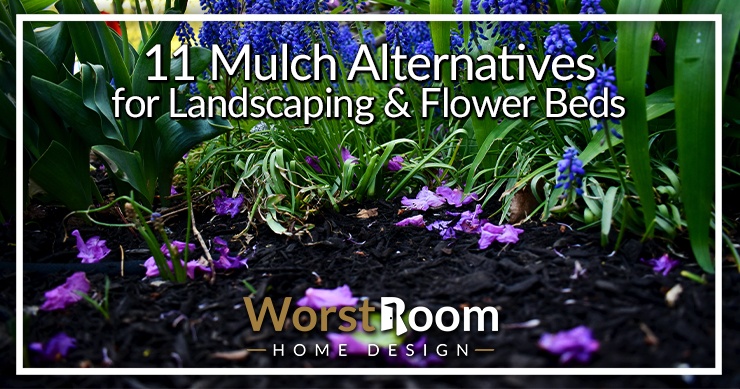
Did you decide to landscape your garden but ran out of mulch? And the store near you doesn’t have any in stock either? Time to consider one of the mulch alternatives.
Or is your traditional mulch not doing the job that it’s supposed to and you want some variety?
You don’t need to worry because we have compiled a list of the best alternatives to mulch that you can use according to your specific needs.
11 Mulch Alternatives
Let's take a look at the options in no particular order. You'll find that we've listed the pros and cons for each alternative to mulch to help you keep it straight in your mind.
Pumice Rock
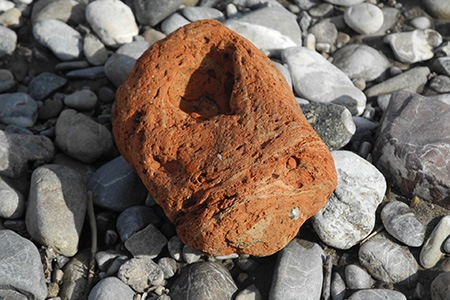
Pros:
- Adds a visual appeal
- Highly effective in protecting the soil
- Resistant to different weather conditions
Cons:
- Is on the expensive side
- Since rocks tend to heat up under prolonged sunlight, they can damage weak or sensitive plants
Commonly known as lava rock or volcanic rock, pumice rocks are some of the best alternatives to mulch. Along with retaining moisture from the soil, it also prevents the formation of fungi and mold.
Furthermore, pumice rocks also provide added aeration to the soil, thereby preventing it from getting infected with insects and other creatures.
Most pumice rocks are bright and rusty, which adds to the beauty of the flowerbeds and plants.
Pea Gravel
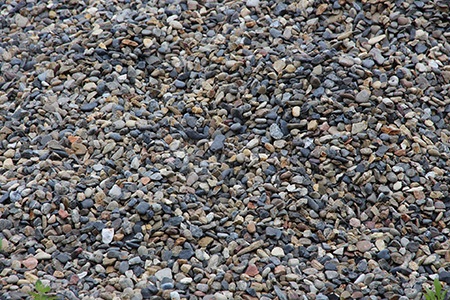
Pros:
- Quite pleasing to look at
- Doesn’t decompose like traditional mulch
- Available in a variety of shades
Cons:
- Can be a little expensive
- Hard to use even with various types of shovels
These are not like the regular gravel stones that we see. Instead, pea gravel stones are small stones that are round in shape and very smooth in texture.
Pea gravel stones are also quite aesthetically pleasing and are commonly found near lakes and other bodies of water.
From gardens and front yards to patios, driveways, driveway alternatives, and even playgrounds, pea gravels are some of the most commonly used mulch alternatives. This is also because they prevent weeds and other crawlers from growing on plants.
Rubber Mulch
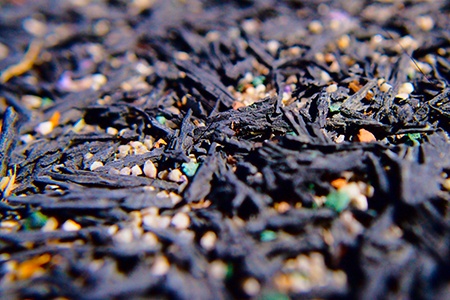
Pros:
- Quite durable and long lasting
- Helps to keep the soil insulated and moist
- Prevents insects from infecting the soil
Cons:
- Difficult to find
- Costlier than other alternatives
- Secretes chemicals that can be harmful to the plants in the long run
Made out of ground-up or recycled tires, rubber mulch is commonly used in sports fields, playgrounds or other open landscapes. It comes in a wide range of qualities which affect its costs, including various pros and cons.
However, it lasts for a long time. Furthermore, rubber mulch is great if you wish to repel all types of termites and other insects from infesting your garden.
Leaves

Pros:
- The cheapest alternative out there
- Very environmentally friendly
- Promotes the health of plants and soil
Cons:
- May require a separate leaf mulcher to shred the leaves that can be used as mulch
- May infect plants if they have been eaten by insects
Leaves are probably the most easily found and eco-friendly alternatives to traditional mulches.
In addition to saving you hundreds of dollars leaves also help to keep the plants and soil healthy owing to their nutrient content.
Newspaper & Cardboard
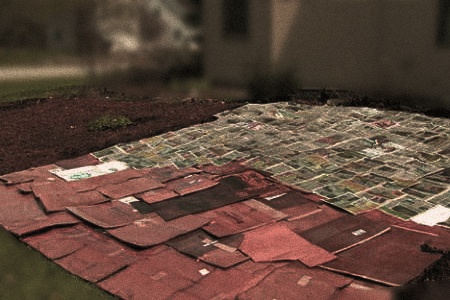
Pros:
- Saves a lot of money
- Easily available
- Quite eco-friendly
Cons:
- May contain harmful chemicals
- Cardboards often contain toxic chemicals that can affect the plants
Some of the most easily available materials that we can use as alternatives to mulch around the house are newspapers and cardboard.
You can find these things in almost every household which makes it cost effective as well. Newspapers and cardboard can serve as great mulch alternatives since they insulate the soil quite nicely.
Grass Clippings
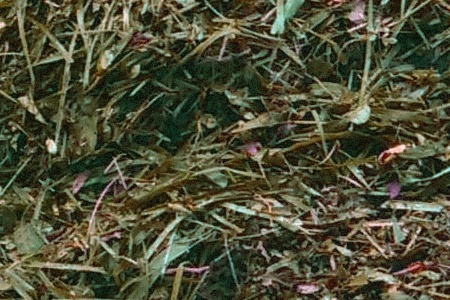
Pros:
- Quite easy on the pocket
- Readily available
- Can be mixed with compost
- Helps in the growth of plants due to the presence of nitrogen
Cons:
- Requires a lawn mower to shred the grass
- Requires a bit of time to dry the grass or turn it into compost
- May cause seeding in the ground or unwanted plant growth
Another way to beautify and add nutrients to your garden is by using the grass clippings that you would otherwise throw away from your types of lawn mowers with a bagger attachment.
You can dry or compost the freshly cut grass and thereafter use it in place of traditional mulch to insulate the soil and protect the plants. You no longer need to worry about how to dispose of grass clippings if you re-use it in this way.
Straw or Hay
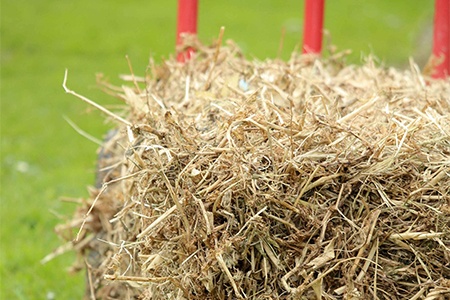
Pros:
- Quite easy to use
- Very cheap and affordable
- Helps in the healthy growth of plants and vegetables
Cons:
- May attract animals that like straw
- Can serve as hiding grounds for insects and snakes
- Needs regular replacement since they can decompose over time
Commonly used in large plots of land or gardens, straw or hay are quite popular alternatives to mulch. In addition to being quite convenient to use, they also provide the gardens with a rustic look.
Moreover, straw or hay can also be used to retain the soil moisture, suppress the growth of weed and add nutrients to the soil.
Pine Needles
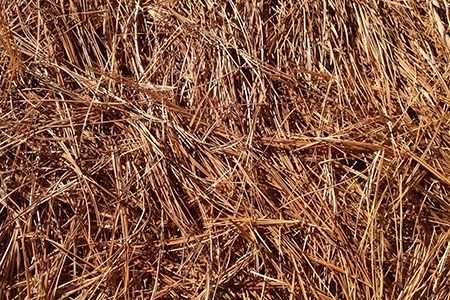
Pros:
- Quite visually pleasing
- Can retain water, nutrients and oxygen really well
- Works well with a variety of plants, flowers, fruits and vegetables
Cons:
- Might not work in soils with high acidity levels
Commonly known as pine straw, pine needles can also be used in place of mulch. You can use them while they are fresh or dried out too. They are one of the most common answers to the question of what to use instead of mulch.
Moreover, pine needles also provide a more pleasant look to the garden. They can be used just by themselves or along with fresh plants and flowers to add a brighter appeal to your front porch, gardens and yards.
Cocoa Bean Hulls
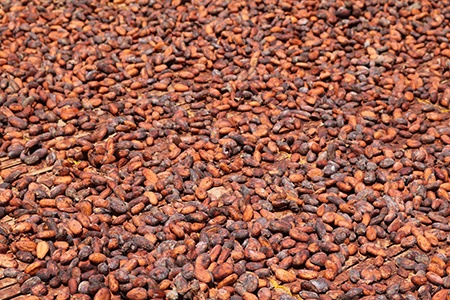
Pros:
- Organic in nature
- Works well to retain moisture in the soil
- Looks great
Cons:
- Can be expensive
- May be difficult to find
- Are lethal to animals when eaten or ingested
Cocoa beans have hulls (outer shells) that need to be removed before they are eaten or used in foods and drinks.
These cocoa bean hulls are some of the best alternatives to the traditional wood chip mulches. They can retain water, look vibrant and have a pleasant sweet smell. They work well as mulch for urban landscapes such as on balconies and in pots.
Compost

Pros:
- Rich in minerals and nutrients
- Readily available
- Quite inexpensive
- Helps the flowers and plants to grow faster
Cons:
- If used fresh, animal compost can burn the roots of plants
- Can smell bad
- May react with soils that have high acidity levels
We all know about compost. From being one of the most environmentally friendly options to being readily available, compost is also quite easy to make in your own garden.
It boasts of a lot of nutrients that are rich for plants and the soil. You can also find animal compost along with plant compost, which is more enriched with minerals.
Landscape Fabric
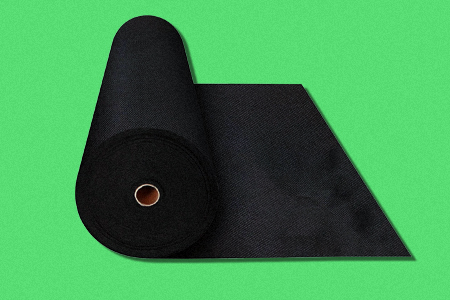
Pros:
- Helps to repel insects and earthworms
- Can be used in conjunction with other traditional mulches or alternatives
- Prevents the growth of weeds
Cons:
- Not visually appealing
- Takes a lot of time to install
- Can’t withstand extreme weather conditions
- Requires replacement every year
Often known as a weed barrier, landscape fabric is one of the lesser-used alternatives of mulch. Some people place it under mulch or spread out types of landscaping rocks. The problem is the weeds will grow in the mulch on top of this weed barrier in time.
While it helps to retain the moisture and water in the soil and provides good aeration, it lacks nutrients and minerals and requires annual replacement.
What Is Mulch & How Is It Helpful?
A vital product in every garden shed, mulch is a material that is spread over a plant or around it to enrich the soil. Some common types of mulch include compost, decaying leaves, and tree bark.
Gardeners use mulch to help the plant retain moisture, reduce the growth of weeds as well as to insulate the roots of the plants.
Furthermore, this garden material also enhances the beauty and appeal of the flowerbeds. Mulch also helps to reduce soil erosion and can double up as a nutrient for plants after decomposing.
The Need for Alternatives to Mulch
In addition to beautifying and protecting the soil and other landscaping features, mulch alternatives also have the same moisture retention properties as traditional mulch.
However, they add a different touch to your types of gardens. Also, while mulch is quite effective, it can get difficult to maintain and may need regular replacement.
This is where mulch alternatives for landscaping can be of immense help to home gardeners and landscapers.
Cover your garden with one of the following alternatives and save your time, money as well as effort when it comes to enhancing the aesthetics of your garden.
Mulch Alternatives for Every Garden & Flowerbed
And there you have it—the best alternatives that you can get your hands on. However, before choosing an alternative to traditional much, ensure that you know what purpose you need the mulch alternative to serve.
Also, decide the kind of aesthetics you want your garden to have, along with what time of the year you are using the mulch.
Our advice? Choose an alternative that is good to look at, but also provides nutrients and minerals to the soil and plants and lasts a long time.
So what are you waiting for? Put on your gardening gloves and get ready to decorate and revamp your garden, front yards, or porches with these useful mulch alternatives.



